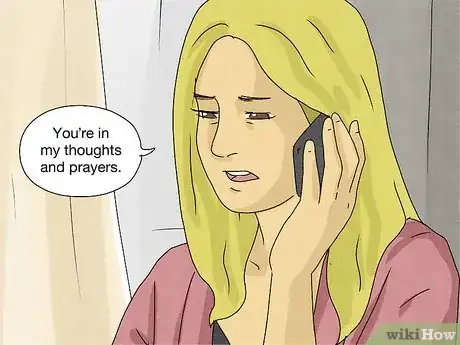This article was written by Kateri Berasi, PsyD and by wikiHow staff writer, Sophia Latorre. Dr. Kateri Berasi is a Licensed Clinical Psychologist and the Founder of Transcendent Self, PLLC, a group therapy practice offering affirmative, collaborative, and intentional care, based in Brooklyn, New York. With over ten years of experience in the mental health field, Dr. Berasi specializes in working with adults from the LGBTQIA+ community and creative industries through individual therapy, couples counseling, group therapy, and costume therapy. She holds a BA in Psychology, Art History, and French Language and Literature from George Washington University and an MA and MEd in Mental Health Counseling from Columbia University. Dr. Berasi also holds a PsyD in Clinical Psychology from Long Island University.
This article has been viewed 12,257 times.
Do you want to comfort someone close to you on the anniversary of their loved one’s passing, but aren’t sure what to say? In truth, there is no one right thing to say. The best thing to do is simply speak from the heart and let them know that you’re there for them. Whether you’re visiting them in person or sending a text, email, letter, or card, we’ve compiled tons of thoughtful messages to show that you care.
This article is based on an interview with our licensed clinical social worker and certified yoga therapist, Ken Breniman. Check out the full interview here.
Things You Should Know
- Acknowledge the person's passing and don’t be afraid to say their name. Let your friend or family member know that you’re thinking of them on this day.
- Show your support. Let your loved one know you’re available to them and offer to bring them a meal or take care of a daily task to give them a break.
- Ask how you can honor their loved one’s memory. Also, give them the opportunity to talk about the person who’s passed.
- Avoid passing judgment on how or how long a person grieves. Steer clear of platitudes like “He’s in a better place,” as well.
Steps
Expert Q&A
-
QuestionHow can I be supportive on a death anniversary?
 Kateri Berasi, PsyDDr. Kateri Berasi is a Licensed Clinical Psychologist and the Founder of Transcendent Self, PLLC, a group therapy practice offering affirmative, collaborative, and intentional care, based in Brooklyn, New York. With over ten years of experience in the mental health field, Dr. Berasi specializes in working with adults from the LGBTQIA+ community and creative industries through individual therapy, couples counseling, group therapy, and costume therapy. She holds a BA in Psychology, Art History, and French Language and Literature from George Washington University and an MA and MEd in Mental Health Counseling from Columbia University. Dr. Berasi also holds a PsyD in Clinical Psychology from Long Island University.
Kateri Berasi, PsyDDr. Kateri Berasi is a Licensed Clinical Psychologist and the Founder of Transcendent Self, PLLC, a group therapy practice offering affirmative, collaborative, and intentional care, based in Brooklyn, New York. With over ten years of experience in the mental health field, Dr. Berasi specializes in working with adults from the LGBTQIA+ community and creative industries through individual therapy, couples counseling, group therapy, and costume therapy. She holds a BA in Psychology, Art History, and French Language and Literature from George Washington University and an MA and MEd in Mental Health Counseling from Columbia University. Dr. Berasi also holds a PsyD in Clinical Psychology from Long Island University.
Licensed Clinical Psychologist It might be helpful to engage in a ritual such as visiting the deceased person's grave or by going to places that the deceased person used to love. It's ultimately up to the grieving individual and what kind of support they'd prefer, though.
It might be helpful to engage in a ritual such as visiting the deceased person's grave or by going to places that the deceased person used to love. It's ultimately up to the grieving individual and what kind of support they'd prefer, though.
Warnings
- Try not to say things like “It’s God’s will,” “She’s in a better place,” “Everything happens for a reason,” or “It’s for the best.”⧼thumbs_response⧽
- Even if you have good intentions, avoid telling the person you know how they feel or comparing their experience to yours or someone else’s.⧼thumbs_response⧽
- Steer clear of any personal or intrusive questions about the person who passed or their estate.⧼thumbs_response⧽
References
- ↑ https://www.helpguide.org/articles/grief/helping-someone-who-is-grieving.htm
- ↑ https://www.health.harvard.edu/mind-and-mood/ways-to-support-someone-who-is-grieving
- ↑ https://www.apa.org/topics/trauma/anniversary-traumatic-event
- ↑ https://www.helpguide.org/articles/grief/helping-someone-who-is-grieving.htm
- ↑ https://www.apa.org/topics/trauma/anniversary-traumatic-event




































































